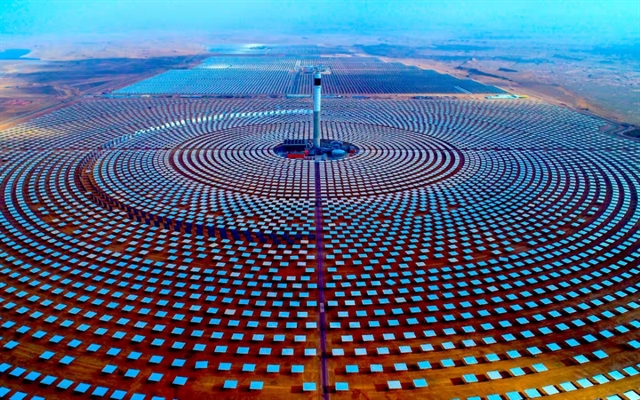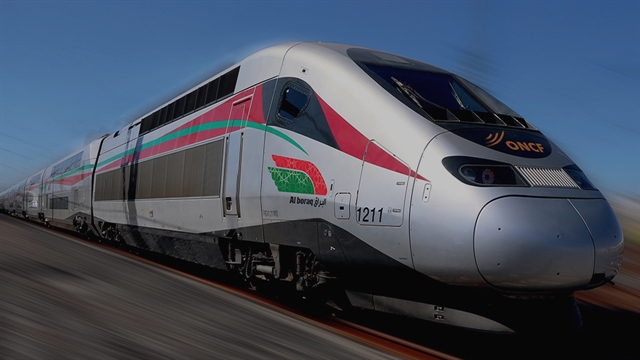.jfif) Opinion
Opinion

On the 25th anniversary of the enthronement of His Majesty King Mohammed VI, Ambassador Jamale Chouaibi wrote to Việt Nam News about Morocco’s achievements and bilateral cooperation with Việt Nam.
On July 30 Morocco celebrates the 25th anniversary of the enthronement of His Majesty King Mohammed VI, under whose visionary leadership Morocco continues to stand out today as a voice of moderation, a peaceful and stability provider within a region full of turbulence.
Morocco has also been transformed during His Majesty’s reign into a regional powerhouse and a model of progress. At the heart of Morocco's transformation lies a robust economic strategy that has propelled the country into the 21st century. With more than 50 free-trade agreements, Morocco nowadays provides access to a consumer market of 2.5 billion people.
Morocco, besides diversifying its partners, has also successfully diversified its economy. While strengthening its traditional industries, such as agri-food, pharmaceuticals and tourism, by making them more competitive, Morocco stimulated new emerging sectors, notably the automotive industry and aerospace.
The automotive sector has emerged as a shining example of this diversification and accounts for 86 per cent of exports with an annual production of 700.000 vehicles per year, generating US$13 billion in 2023.
 |
| Ouarzazate Solar Power Station. Photos courtesy of the embassy |
Infrastructure development has played a crucial role in this economic transformation. The Tanger Med port, one of the largest and most modern in Africa and the Mediterranean, has transformed Morocco into a pivotal hub for international trade and by the same token enhanced Morocco's logistics capabilities.
Additionally, Morocco's high-speed rail network symbolises Morocco's commitment to cutting-edge infrastructure and technology. It has both revolutionised domestic transportation and improved connectivity within the country.
Another impressive achievement has been Morocco's emergence as a leader in renewable energy in Africa. The share of renewable electricity production will reach 52 per cent by 2030 and will rise to 60 per cent by 2040.
All Moroccans take much pride in the fact that these achievements enhanced and raised the stature of Morocco which in recognition of his efforts will get the honour and the privilege to co-host, together with our neighbours Spain and Portugal, the FIFA World Cup in 2030. Two continents – Africa and Europe – united not only in a celebration of football but also in providing unique social and cultural cohesion.
Việt Nam and Morocco: forging a multifaceted partnership across continents
In recent years, Việt Nam and Morocco have embarked on a journey of enhanced bilateral cooperation. This burgeoning partnership, spanning political, economic and cultural aspects, demonstrates the shared vision of both countries to leverage their complementary strengths and geographical positions for mutual benefit.
At the core of this evolving relationship is a strong commitment to concerted coordination and mutual support in international arenas. Việt Nam and Morocco have aligned their efforts in various multilateral forums, amplifying their voices on global issues and advancing the agenda of the south.
This year has seen an exchange of high-level visits between Morocco and Việt Nam. The visit to Rabat of Nguyễn Trọng Nghĩa, Politburo member, Secretary of the Party Central Committee of Việt Nam and head of the Committee's Commission for Information and Education and the visit to Hà Nội of Mr. Najib El Khadi, Secretary General of the Moroccan House of Representatives, underscoring the commitment and the political will to further strengthening bilateral relations.
 |
| A high-speed train in Morocco. |
The economic dimension of the Việt Nam-Morocco partnership shows immense promise, with both countries recognising significant untapped potential. Key areas identified for mutually beneficial cooperation include agricultural products, energy, textiles, chemicals, fertiliser production, mining and mineral processing. The complementary nature of their economies presents opportunities for substantial growth in bilateral trade.
Both Việt Nam and Morocco see their partnership as a gateway to broader regional cooperation. Morocco's strong presence in Africa as the first and largest investor in western Africa and the second at the continental level, places it as a potential bridge for Việt Nam to access African markets, particularly in West Africa.
Similarly, Việt Nam, as a key player in ASEAN, offers Morocco enhanced connectivity with Southeast Asian nations. Morocco's accession to the Treaty of Amity and Cooperation in Southeast Asia (TAC) in 2016, and to the status of Sectoral Dialogue Partner of ASEAN in 2023, exemplifies this strategic orientation. Việt Nam's support for Morocco's bid for the two aforementioned ASEAN bodies and similarly, Morocco's backing of Việt Nam's engagement with the African Union and to the African continent, further reflects a reciprocal commitment to fostering broader regional partnerships and solidarity across continents between the two countries.
Future Prospects
Looking ahead, the Việt Nam-Morocco partnership should focus on enhancing cooperation in areas of comparative advantages. The upcoming session of the Sub-committee on Trade and Industrial Cooperation to be held in Rabat next October will set a roadmap and an action plan to this regard.
With strong political will on both sides, as demonstrated by recent high-level engagements, our bilateral cooperation is poised to gain momentum and strength in the coming years. Our ambition is to bring it to new heights so that it can serve as a model of cross-continental cooperation which transcends geographical boundaries and cultural differences, embodying the spirit of international collaboration in an interconnected world. VNS




